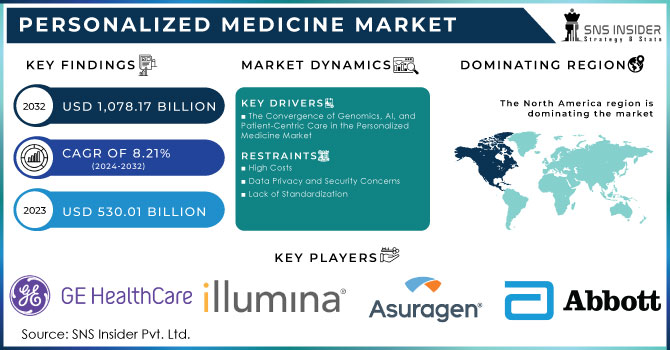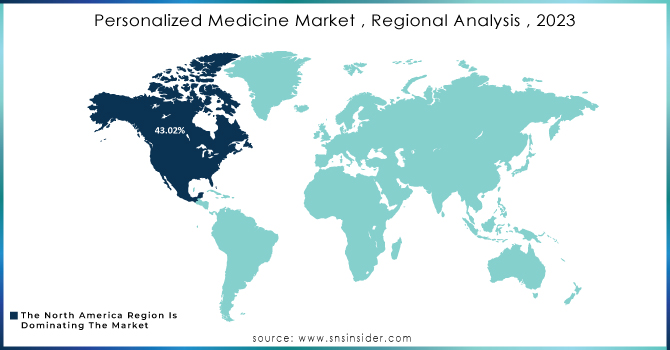Personalized Medicine Market Report Scope & Overview:

Get more information on Personalized Medicine Market - Request Sample Report
The Personalized Medicine Market was valued at USD 530.01 billion in 2023, and is expected to reach USD 1,078.17 billion by 2032, and grow at a CAGR of 8.21% over the forecast period 2024-2032.
The healthcare landscape is undergoing a seismic shift, driven by a growing consumer demand for personalized care. This, coupled with a growing distrust of traditional healthcare systems, is fueling a surge in self-service health solutions. According to Abbott Research which indicates a strong patient desire for tailored healthcare at 72% of respondents expressed a need for treatment plans that directly address their specific health conditions and data.
Personalized medicine is increasingly demanded across a spectrum of medical conditions. The unique biological makeup of each individual necessitates tailored treatments. Chronic diseases like diabetes highlight this need, as blood sugar control and medication efficacy vary widely. Cancer treatment, too, requires a personalized approach, given the diverse genetic makeup of tumors and patient responses to therapies. Mental health conditions also underscore the importance of individualized care, as symptoms and treatment responses differ significantly between patients. According to the World Health Organization, the number of people living with diabetes skyrocketed from 108 million in 1980 to a staggering 422 million in 2024. This alarming increase is particularly pronounced in low and middle-income countries, underscoring the urgent need for global health interventions.
Meeting this demand for personalized medicines presents significant challenges. Developing treatments tailored to specific genetic profiles, lifestyle factors, and disease variations requires substantial research and development investment. Additionally, ensuring equitable access to these advanced therapies is a complex issue that requires careful consideration of cost, distribution and healthcare infrastructure.
The supply of personalized medicines is currently in its infancy. While the potential benefits are immense, significant hurdles, remain. Developing these treatments is a complex and costly endeavor, requiring substantial investments in research and development. Additionally, manufacturing personalized medicines on a large scale presents logistical challenges. Ensuring equitable access to these therapies is another critical issue. Factors such as cost, infrastructure, and healthcare disparities can hinder the widespread availability of personalized medicine, particularly in low and middle-income countries. Despite these challenges, ongoing advancements in technology and increasing recognition of the potential benefits are driving progress in this field.
ClinicalTrials.gov reveals a promising development i.e. 42 ongoing phase 3 and 4 trials dedicated to personalized medicine. These later-stage trials aim to confirm the safety and efficacy of these tailored treatments.
Government initiatives and regulatory frameworks are pivotal in driving the development and adoption of personalized medicine. To foster innovation, many countries are investing in research and development, offering tax incentives, and creating public-private partnerships. For instance, the Precision Medicine Initiative in the United States has spurred significant advancements. On the regulatory front, agencies like the FDA are adapting guidelines to accommodate the unique challenges of personalized medicine, focusing on real-world evidence and patient-centric outcomes. However, balancing innovation with patient safety and ensuring equitable access remain key challenges. The FDA has also approved numerous personalized medicines, especially in cancer treatment, using genetic markers and diagnostic tests to match patients with optimal therapies.
Overall, personalized medicine holds immense potential to revolutionize healthcare. It is poised to become a cornerstone of future medical practices.
MARKET DYNAMICS
Drivers
-
The Convergence of Genomics, AI, and Patient-Centric Care in the Personalized Medicine Market
The personalized medicine market is undergoing a transformative evolution, driven by a complex interplay of scientific advancements, evolving healthcare paradigms, and supportive regulatory environments. At the forefront are groundbreaking developments in genomics and biotechnology, which have unlocked the human genetic code and paved the way for precision medicine. By identifying specific genetic markers associated with diseases, researchers and clinicians can now develop targeted therapies tailored to individual patients, offering the promise of more effective and less toxic treatments. The rising prevalence of chronic diseases, such as diabetes, heart disease, and cancer, has amplified the need for personalized approaches. These conditions often exhibit significant patient-to-patient variability, making traditional one-size-fits-all treatments less effective. Personalized medicine offers the potential to optimize treatment plans, improve patient outcomes, and enhance quality of life. Furthermore, a growing emphasis on patient-centric care has aligned perfectly with the goals of personalized medicine. By involving patients in treatment decisions and tailoring care to their individual needs and preferences, healthcare providers can foster stronger therapeutic relationships and improve adherence to treatment regimens.
Technological advancements, particularly in artificial intelligence, big data analytics, and digital health, are accelerating the development and implementation of personalized medicine. These tools enable the analysis of vast amounts of patient data, including genetic, clinical, and lifestyle information, to identify patterns and inform treatment decisions. Additionally, digital platforms facilitate remote monitoring, patient engagement, and the delivery of personalized interventions.
Lastly, supportive government policies and investments are essential for the growth of the personalized medicine market. By providing funding for research, developing regulatory frameworks, and incentivizing innovation, governments can accelerate the development and adoption of personalized therapies.
These converging factors are collectively driving the personalized medicine market towards a future where healthcare is more precise, effective, and patient-centered.
Restraints
-
High Costs
The development and implementation of personalized treatments can be prohibitively expensive, limiting accessibility for many patients.
-
Data Privacy and Security Concerns
Handling sensitive genetic and health data requires robust security measures, which can be complex and costly to implement.
-
Lack of Standardization
The absence of standardized data formats and analytical tools can hinder the integration and analysis of patient data.
Key Segmentation
By Product
Personalized nutrition and wellness segment held a dominated 32.57% share of the personalized medicine market. This segment is experiencing rapid growth due to increasing consumer interest in tailored health solutions and favorable regulatory conditions. Conversely, the personalized medicine therapeutics segment is projected to be the fastest-growing sector in the market, with a robust CAGR anticipated from 2024 to 2032. Advancements in genomics and decreasing sequencing costs are the primary drivers of this accelerated growth.
By End-use
Hospitals dominated the personalized medicine market in 2023 with 68.2% share, capturing the largest revenue share. This sector's influence is substantial as hospitals serve as both primary consumers and key drivers of personalized medicine adoption. The increasing integration of genomic diagnostics and targeted therapies within hospital settings is accelerating market growth. As early adopters of personalized medicine, hospitals are significantly influencing the development of new diagnostic tools and therapeutic approaches, ultimately shaping the future of this transformative healthcare field.
Regional Analysis
North America dominated the market with 43.02% in 2023, driven by substantial investments in research and development by pharmaceutical giants and research institutions. The region's advanced diagnostic capabilities, exemplified by innovations like Illumina's TruSight Oncology 500 assay, are fueling market expansion.
Europe is another key player, with Germany, the UK, and France at the forefront. These countries are witnessing significant growth due to a combination of research initiatives, government support, and the development of companion diagnostics.
Meanwhile, the Asia Pacific region is emerging as a rapidly growing market, propelled by increasing healthcare expenditure, infrastructure development, and strategic partnerships. China, in particular, is poised for substantial growth due to government support and a growing focus on preventive healthcare.

Need any customization research on Personalized Medicine Market - Enquiry Now
Key Players:
The major key players are GE Healthcare, Illumina, Inc., ASURAGEN, INC., Abbott, Dako A/S, Exact Sciences Corporation, Danaher Corporation (Cepheid, Inc.), Decode Genetics, Inc., QIAGEN, Exagen Inc., Precision Biologics, Celera Diagnostics LLC., Biogen, Genelex, Genentech, Inc., 23andMe, Inc., and Others.
RECENT DEVELOPMENTS
Viome Life Sciences made a strategic move in November 2023 by acquiring Naring Health. This acquisition strengthened Viome's position in personalized nutrition and wellness by incorporating advanced health monitoring capabilities.
| Report Attributes | Details |
| Market Size in 2023 | US$ 530.01 Bn |
| Market Size by 2032 | US$ 1078.17 Bn |
| CAGR | CAGR of 8.21% From 2024 to 2032 |
| Base Year | 2023 |
| Forecast Period | 2024-2032 |
| Historical Data | 2020-2022 |
| Report Scope & Coverage | Market Size, Segments Analysis, Competitive Landscape, Regional Analysis, DROC & SWOT Analysis, Forecast Outlook |
| Key Segments | • By Product (Personalized Medicine Diagnostics, Personalized Medicine Therapeutics) • By End User (Hospitals, Diagnostic Centers, Research & Academic Institutes, Others) |
| Regional Analysis/Coverage | North America (US, Canada, Mexico), Europe (Eastern Europe [Poland, Romania, Hungary, Turkey, Rest of Eastern Europe] Western Europe] Germany, France, UK, Italy, Spain, Netherlands, Switzerland, Austria, Rest of Western Europe]), Asia Pacific (China, India, Japan, South Korea, Vietnam, Singapore, Australia, Rest of Asia Pacific), Middle East & Africa (Middle East [UAE, Egypt, Saudi Arabia, Qatar, Rest of Middle East], Africa [Nigeria, South Africa, Rest of Africa], Latin America (Brazil, Argentina, Colombia Rest of Latin America) |
| Company Profiles | GE Healthcare, Illumina, Inc., ASURAGEN, INC., Abbott, Dako A/S, Exact Sciences Corporation, Danaher Corporation (Cepheid, Inc.), Decode Genetics, Inc., QIAGEN, Exagen Inc., Precision Biologics, Celera Diagnostics LLC., Biogen, Genelex, Genentech, Inc., 23andMe, Inc. |
| Key Drivers | • The Convergence of Genomics, AI, and Patient-Centric Care in the Personalized Medicine Market |
| Market Opportunities | • High Costs • Data Privacy and Security Concerns • Lack of Standardization |

